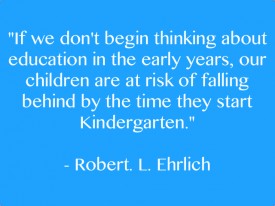
With the increased focus in recent years on Pre-Kindergarten learning, you may be asking where you can find funding for early childhood education. Your school may be looking to establish or expand a pre-school program, or you may need funds for an independent pre-school program. Public funding for Pre-Kindergarten education mainly comes from three sources: state funding, federal Special Education (IDEA) funds for Pre-K, and federal Head Start funding.
Federal Funding
One way in which the federal DOE has shown its commitment to early learning is by increasing the funding to both IDEA for Pre-K and federal Head Start over the last two years. In addition, there are other federal funding sources for Pre-K: social services programs, like the federal Child Care and Development fund, and federal Temporary Assistance to Needy Families. And there are provisions in Title I that allow schools to use some Title I funds for Pre-Kindergarten programs, such as the stipulation allowing schoolwide Title I programs to “establish or enhance prekindergarten programs for children below the age of 6.” According to the federal non-regulatory guidance, Serving Preschool Children Through Title I, “The use of Title I funds for a preschool program is a local decision.”
Some new federal sources of Pre-K funding have also been created: Promise Neighborhoods (which has an early learning component) and the Race to the Top Early Learning Challenge grants are likely to continue in some form as signature programs of the Obama administration. During the next four years, the federal DOE will focus more intently on the full Pre-K – Grade 3 continuum, especially working with Congress to embed Pre-K-3 strategies in a new ESEA.
But some Pre-K programs have also been cut from the federal budget, such as Even Start and Early Reading First. The purpose of the latter – “to enhance the early language, literacy, and prereading development of preschool age children” – has been absorbed into the newer Striving Readings Comprehensive Literacy grant, which provides a continuum of reading from birth through twelfth grade, though the future of SRCL is somewhat in question.
State Funding
In 2011, 39 states provided Pre-K funding (the other 11 states were: Arizona, Hawaii, Idaho, Indiana, Mississippi, Montana, New Hampshire, North Dakota, South Dakota, Utah, and Wyoming). In fact, more children are enrolled in state funded Pre-Kindergarten programs than in any other publicly funding Pre-K program, though the per-student amount varies dramatically in states from $2,000 to $11,000. State Pre-K funding goes to both community based organizations and school districts.
Want to Research Further?
- State Pre-K Funding: http://nieer.org/yearbook.
- Federal, State, and Private Pre-K Funding: http://febp.newamerica.net/background-analysis/pre-k-funding.
- Special Education/Individuals with Disabilities Education Act
- Office of Special Education Programs: http://www2.ed.gov/about/offices/list/osers/osep/index.html.
- Special Education – Grants to States Home Page: http://www2.ed.gov/programs/osepgts/index.html.
- Special Education, Parts B and C State Allocation Tables: http://www2.ed.gov/fund/grant/apply/osep/2012apps.html.
- Special Education State Contacts: http://www2.ed.gov/policy/speced/guid/idea/monitor/state-contact-list.html.
- IDEA, Title I, Part B, Section 619: Preschool Grants: http://idea.ed.gov/explore/view/p/%2Croot%2Cstatute%2CI%2CB%2C619%2C.
- IDEA, Title I, Part C, Sections 631-644: Infants and Toddlers with Disabilities: http://idea.ed.gov/explore/view/p/%2Croot%2Cstatute%2CI%2CC%2C.
- State and Local Funding Formulas: http://idea.ed.gov/explore/view/p/%2Croot%2Cdynamic%2CTopicalArea%2C9%2C.
- Title I
- Title I Home Page: http://www2.ed.gov/programs/titleiparta/index.html.
- Title I State and District Award Amounts: http://www2.ed.gov/about/overview/budget/titlei/fy11/index.html.
- Non-Regulatory Guidance, “Serving Preschool Children Through Title I”: http://www2.ed.gov/policy/elsec/guid/preschoolguidance2012.pdf.
- Title I Law: http://www2.ed.gov/policy/elsec/leg/esea02/pg2.html#sec1112, in particular, Sections 1112(b)(1)(E)(i), 1112(b)(1)(K), 1114(b)(1)(B)(iii)(I)(bb), 1114(b)(1)(G), 1114 (c), 1115(b)(1)(B), 1115(b)(2)(B), and 1115(c)(1)(D).
- Head Start
- Office of Head Start: https://www.acf.hhs.gov/programs/ohs.
- Head Start Funding Opportunities: https://www.acf.hhs.gov/programs/ohs/funding.
- Race to the Top – Early Learning Challenge
- Race to the Top – Early Learning Challenge Home Page: http://www2.ed.gov/programs/racetothetop-earlylearningchallenge/index.html.
- Race to the Top – Early Learning Challenge Applicant Info: http://www2.ed.gov/programs/racetothetop-earlylearningchallenge/applicant.html.
- Race to the Top – Early Learning Challenge Awards: http://www2.ed.gov/programs/racetothetop-earlylearningchallenge/awards.html.
- Promise Neighborhoods
- Promise Neighborhoods Home Page: http://www2.ed.gov/programs/promiseneighborhoods/index.html.
- Promise Neighborhoods Applicant Info: http://www2.ed.gov/programs/promiseneighborhoods/applicant.html.
- Promise Neighborhoods Awards: http://www2.ed.gov/programs/promiseneighborhoods/awards.html.
- Child Care and Development Fund: http://www.hhs.gov/recovery/programs/acf/childcare.html.
Though Pre-Kindergarten education has in the past sometimes languished as the stepchild of K-12 education, its importance is now being realized, resulting in increased funding for early learning and programs.

